I think it’s safe to say that no band has had a career trajectory quite like Weezer. The rises and falls are numerous, and nobody is quite sure what their legacy is. Let’s walk through it.
Sounding like a cross between The Beach Boys, Big Star, and The Rolling Stones, they did not fit into a neat genre box when they released their 1994 debut. Songwriter and vocalist Rivers Cuomo penned a great album’s worth of guitar-heavy power pop songs.
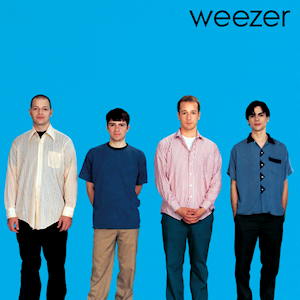 As much as their sound, it’s the lyrics of the instantly-iconic “Blue Album” that stand out. Cuomo’s unironic depiction of life as a congenial outcast still feels totally unique.
As much as their sound, it’s the lyrics of the instantly-iconic “Blue Album” that stand out. Cuomo’s unironic depiction of life as a congenial outcast still feels totally unique.
Weezer gained some traction with their lead single, the unusual “Undone (The Sweater Song).” “Undone” is easily the most the band has ever sounded like The Velvet Underground. They also made a great video — their first of several iconic videos for the quartet.
But it wasn’t until “Buddy Holly” dropped as a single that the album really took off. The tune is one of the sunniest on the album, catchy with semi-romantic lyrics to counter the alienated feel of “Undone” and some of the album tracks. “Buddy Holly” was certified gold by RIAA, and it peaked at #2 on the Billboard rock charts.
Its music video is inspired: Using a combination of old Happy Days’ footage, body doubles, grainy film filters, and a guest appearance from original cast-member Al Molinaro, Spike Jonze created a great facsimile of The Happy Days. The band appeared to be performing at Arnold’s Drive-In.
“Buddy Holly” is my favorite song on the album, but there’s hardly a weak track. In fact, Weezer has gone down as one of the best albums of the 1990s, and with such a consistent track list, it’s hard to disagree with that notion. The real revelation is Cuomo’s writing and versatility: His tunes range from power-pop numbers (“Surf Wax America,” “Say It Ain’t So”) to heavy guitar pieces (“Only In Dreams,” “Undone”). Each one is emotive, and it all fits together nicely.
As the album and the band blew up, Cuomo faced difficulty adjusting to the fame. Unlike Kurt Cobain, a self-proclaimed hypocrite, Rivers seemed to just struggle with his social awkwardness and the haze of empty acquaintances that goes along with being famous. Here’s what he wrote in 1995:
You will meet two-hundred people every night, but each conversation will generally last approximately thirty seconds, and consist of you trying to convince them that no, you do not want their underwear. Then you will be alone again, in your motel room. Or you will be on your bus, in your little space, trying to kill the nine hours it takes to get to the next city, whichever city it is. This is the life of a rock star.
He retreated home to write his next album, which he envisioned as a space-themed concept album called Songs from the Black Hole. He enrolled in Harvard and underwent painful surgery to fix an issue of having one leg shorter than the other.
He and the band intermittently recorded bits from his space opera album, but in his spare time at Harvard he wrote some dark, extremely personal, self-deprecating songs about his struggles with fame, surgery, and shyness.
Eventually, Weezer realized that the space opera wasn’t going to happen. They started recording Cuomo’s Harvard songs and, shortly after final exams, the band finished their recording sessions for a new album called Pinkerton. They opted against a producer — a very strange move for a mainstream band. Their live recorded sound was what they were going to release.
The resulting album is a very strange follow-up to Weezer. The underlying sadness and isolation of The Blue Album is blown up and made explicit. The sound amplifies the dark, melancholy feeling: These tracks are significantly less polished and more abrasive than on The Blue Album. There are bits of feedback and dissonance, stretches where the songs sound on the verge of careening off the tracks.
When Geffen released Pinkerton, it tanked commercially and critically. Rolling Stone readers famously voted it the third-worst album of 1996, and if you think it through, you can see why. Rock stars singing about why their lives suck is never an easy sell. The sound is not radio-friendly, and Weezer’s early success came from their sunny hooks and their music videos more than their depressed journal entries.
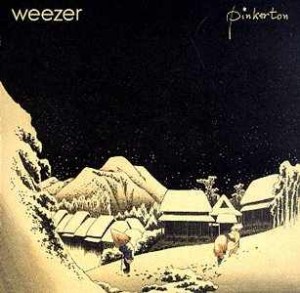 Audience-alienating follow-ups to hit albums are not an uncommon coping mechanism, but Pinkerton feels like something more personal and serious than a simple reaction to fame. Instead of references to 50s celebrities, there are references to masturbation. Instead of a song about a dad’s alcoholism, there’s a song about falling in lust with a Japanese teen when she writes him fan mail. This is Rivers Cuomo revealing what he calls his “dark side” — his fears, his impulses, his shame.
Audience-alienating follow-ups to hit albums are not an uncommon coping mechanism, but Pinkerton feels like something more personal and serious than a simple reaction to fame. Instead of references to 50s celebrities, there are references to masturbation. Instead of a song about a dad’s alcoholism, there’s a song about falling in lust with a Japanese teen when she writes him fan mail. This is Rivers Cuomo revealing what he calls his “dark side” — his fears, his impulses, his shame.
It’s a freaking incredible album, actually. Cuomo is intuitively self-deprecating, and Pinkerton ranges from perverted to mopey to silly to heartbreaking. The lyrics and music match each other perfectly, and there’s an unquantifiable feeling of danger here. The references to Japan, often via the opera Madame Butterfly, give the album cohesion (to the point that it is sometimes mistakenly called a concept album).
But what really makes the album great are how memorable the songs are: “Tired of Sex” shows Cuomo wearying of casual encounters. “The Good Life” is fantastically-written self-doubt, full of specific details from Rivers’ life: “Broken, beaten down, can’t even get around, without an old man cane, I fall and hit the ground.” (Cuomo had to use a cane after his surgery.)
 If I had to pick the three greatest, most distinct and memorable tracks on the album, my picks would be: “Across the Sea,” the previously mentioned song about a Japanese piece of fanmail; “Pink Triangle,” a song about falling for a Lesbian, and “El Scorcho,” a love letter from a sociopath.
If I had to pick the three greatest, most distinct and memorable tracks on the album, my picks would be: “Across the Sea,” the previously mentioned song about a Japanese piece of fanmail; “Pink Triangle,” a song about falling for a Lesbian, and “El Scorcho,” a love letter from a sociopath.
I love “El Scorcho” so much. It’s one of my favorite songs ever — probably top 10 or 15. It’s alternately funny and depressing, but has such a great hook and a great off-kilter, alternate-dimension romantic comedy feel to it.
If Weezer had a hard time with fame and popularity, they took even worse to public apathy and disdain — Cuomo especially. The public’s shrugging rejection of Pinkerton demotivated the band. They went on hiatus and moved back home. Attempts to reunite floundered.
But a funny thing started happening: A different audience began listening to their first two albums, Pinkerton especially. (Pitchfork’s excellent review of 2010’s re-release discusses the audience and relatability of Pinkerton.) Teen emo culture and music blew up, and all of the sudden Weezer looked more like prophets than burnouts.
People wanted Weezer back in their lives, and big checks finally prevailed. Cuomo, who had become depressed and ashamed in the wake of Pinkerton‘s failure, started writing songs again. The band went on tour in 2000, premiering a set of songs during summer shows and recording intermittently.
 Finally, in 2001, a half-decade after Pinkerton, Weezer wrote and recorded a new album. To add to eternal confusion, it was another self-titled album. At least they used a different cover color — green instead of blue. It’s an obvious statement — Weezer was rebooting themselves, returning to the power pop stylings of their first album.
Finally, in 2001, a half-decade after Pinkerton, Weezer wrote and recorded a new album. To add to eternal confusion, it was another self-titled album. At least they used a different cover color — green instead of blue. It’s an obvious statement — Weezer was rebooting themselves, returning to the power pop stylings of their first album.
The critics loved it. And the fan consensus was that the album is…. good. Not awful. Not great. Catchy.
Personally, I can’t stand it. I don’t really like any of the songs on it. Its two biggest hits, “Hash Pipe” and “Island in the Sun,” are decent tracks, but not much else does anything for me. “Simple Pages” has a catchy melody. “Don’t Let Go” as appropriate as a kickoff to their new album — simple and forgettable.
Adding to the frustration is that the tracks that Weezer had debuted over the summer had disappeared. Fans had responded really well to those songs (known as “Songs of Summer 2000” or “SS2K”), but Green was all new songs (minus “Hash Pipe”).
Cuomo eventually leaked an unofficial SS2K album, and while it’s no Pinkerton, I like it a lot more than Green — the songs were funnier with more personality, and more in line with the band’s original attitude.
Regardless, Green sold pretty well — well enough to sustain the band’s motivation in recording. They decided to put out a fourth album and began writing and recording.
Cuomo, who attributed some of the credit for their 2000 reunion to the Internet, became an online pioneer as they prepared for their next album, titled Maladroit. He made Weezer one of the first big-name bands to interact with fans directly on their website. He released demos of tracks for the new album on the Weezer website and asked for comments. Although he declared the attempt to get constructive feedback a failure, it’s not hard to draw a line between Weezer’s online push in 2001-02 with, say, Beyonce’s online release of an album in 2013.
Maladroit, came out about a year after Green was released. It received positive reviews, but the fans abandoned it. Sales plummeted.
 Count me among the few who love Maladroit. I think it’s their third best album behind Blue and Pinkerton. I love almost all of the songs. As a comparison to the vastly overrated Green Album: “Hash Pipe,” my favorite song off of Green, would be about my fourth favorite here. “Island in the Sun,” my second favorite off of Green, would be about my ninth favorite here.
Count me among the few who love Maladroit. I think it’s their third best album behind Blue and Pinkerton. I love almost all of the songs. As a comparison to the vastly overrated Green Album: “Hash Pipe,” my favorite song off of Green, would be about my fourth favorite here. “Island in the Sun,” my second favorite off of Green, would be about my ninth favorite here.
Among the highlights: “Dope Nose” was their best song since “El Scorcho,” “Keep Fishin’” has about three great hooks, “Space Rock” is two minutes of sonic intensity, and “December” is a warm conclusion.
Unfortunately, things again went sour for Weezer. They had a falling out with their label and again went into a frustrated hiatus, albeit a much shorter one. Before long they were making plans to record with producer legend Rick Rubin. They made a bunch of demos — all of which were discarded, much like the SS2K incident. (This unofficial album is called “Album 4.5” or “A5 Demos.”)
 But they did record a full album with Rubin, which they released in 2005, called Make Believe. The critical response was mixed, veering towards negative. The album sold on the strength of hit single “Beverly Hills,” but definitely didn’t convert many new dedicated fans. It actually seemed to alienate their diminishing cult following from their early years thanks to the heavily polished, pop-oriented production.
But they did record a full album with Rubin, which they released in 2005, called Make Believe. The critical response was mixed, veering towards negative. The album sold on the strength of hit single “Beverly Hills,” but definitely didn’t convert many new dedicated fans. It actually seemed to alienate their diminishing cult following from their early years thanks to the heavily polished, pop-oriented production.
I rank it above Green but below Maladroit, and my reaction would probably be viewed by most Weezer fans as overly generous. This album is not exactly a fan favorite.
(We’ll pause again here to let Grant provide some dissent.)
Make Believe seemed to be a tipping point for Weezer. Everything afterwards exists in a separate plane that, depending on who you talk to, is some combination of “sellout chart-bait,” “self-indulgent doodling,” “not caring what anyone thinks,” “branching out,” and — most generally — “shit.”
Their next album, a third self-titled release (this time with a red cover), serves as a second reboot for the band in many ways. Rivers shared the songwriting duties with the rest of the band, and the result is kaleidoscopic and strange. In general, it doesn’t work, but there are some redemptive moments: “Pork and Beans” is catchy if inane (#1 rock hit for eleven weeks). “Thought I Knew” is a one-hit wonder song from 1999 in some alternate universe.
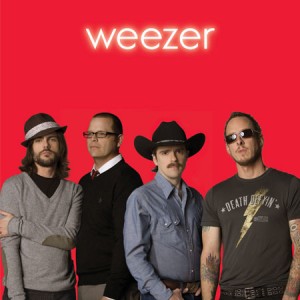 The song off The Red Album I will defend to the grave, though, is “The Greatest Man That Ever Lived (Variations on a Shaker Hymn).” It’s wacky and silly, but inspired. Weezer blazes through six or so different takes on a song that sounds a lot like Copland’s “Simple Gifts,” to the repeated lyric of “I am the greatest man that ever lived.” It’s bizarre, but unexpectedly fun.
The song off The Red Album I will defend to the grave, though, is “The Greatest Man That Ever Lived (Variations on a Shaker Hymn).” It’s wacky and silly, but inspired. Weezer blazes through six or so different takes on a song that sounds a lot like Copland’s “Simple Gifts,” to the repeated lyric of “I am the greatest man that ever lived.” It’s bizarre, but unexpectedly fun.
Weezer has released three albums (two of originals, one of rarities) since then, and I have pretty much nothing to say about them except that I never returned after one play-through. If you think you can convince me to give them another shot, please leave a comment defending them.
One exception: “(If You’re Wondering If I Want You To) I Want You To” off Raditude is a track I love. It might be one of my top five Weezer songs, actually. It’s catchy with a great sing-along chorus and some clever double-entendre lyrics. The album version is great, but the adorable, live duet versions featuring Sara Bareilles? Freaking incredible.
So while I’ll always love those first two albums the most, I do appreciate that it’s been a wild, divisive ride since then. Thanks, Weezer for some incredible writing courtesy Cuomo, some of the best power-pop hooks since Big Star, and the most fascinating career trajectory that I am familiar with.
=w=


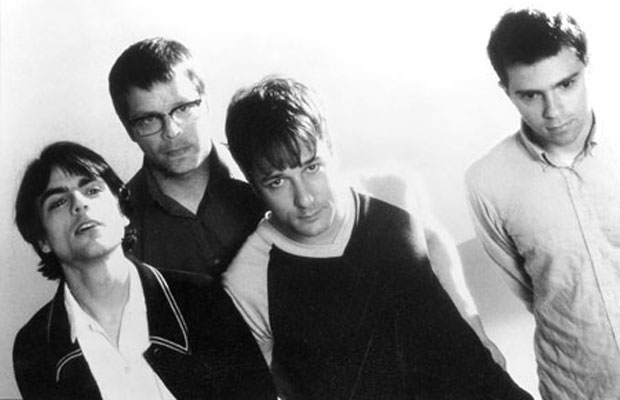

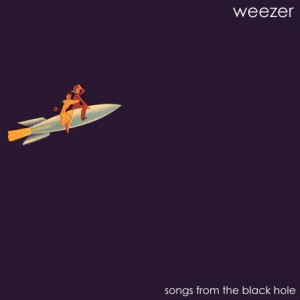
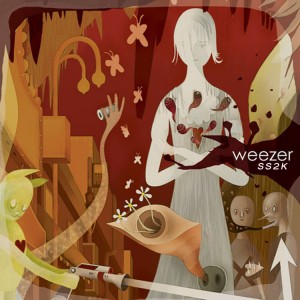



Enjoyed reading this one. Man, I can’t believe I still have that review of Pinkerton on here…I think I wrote that 35 years ago, when I’d listened to a fraction of the music I have now. I’m a little higher on it than I was, although I fully stand by the notion that his lyrics irritate the crap out of me.
And I stand by Make Believe being awesome. So much more fun and pleasant-sounding than much of their stuff.